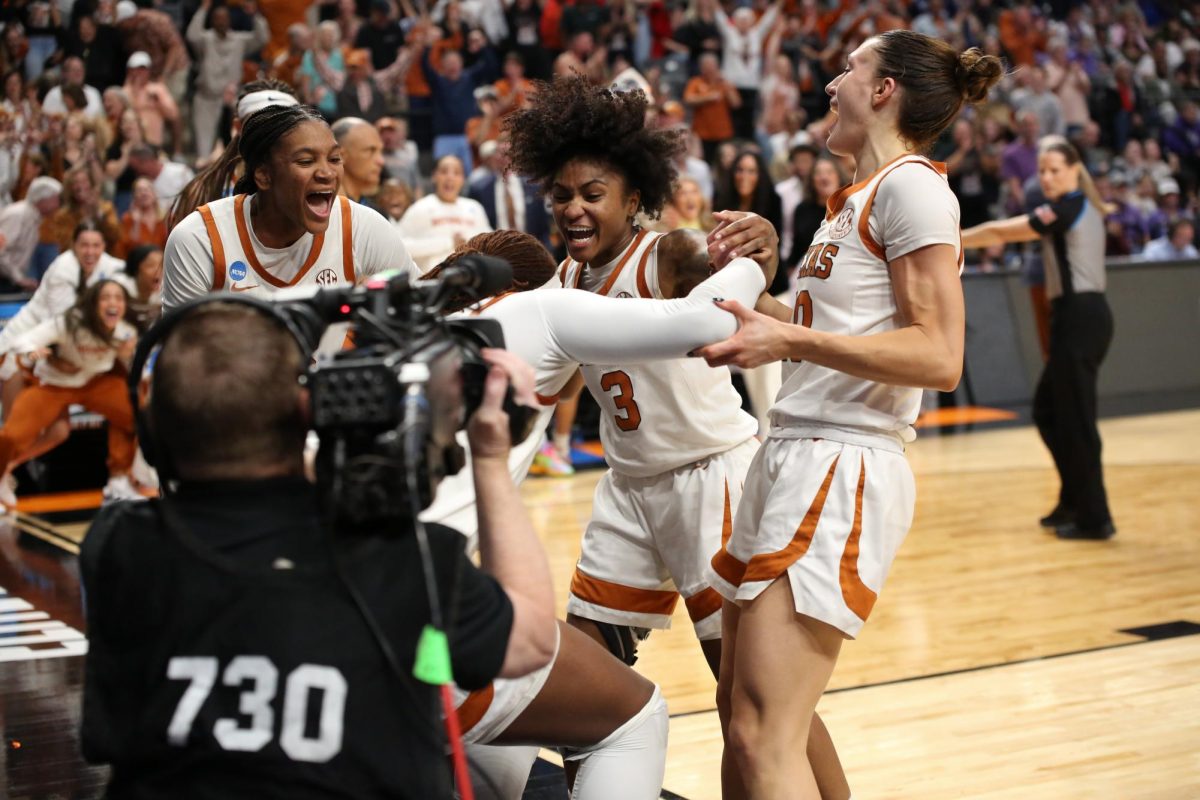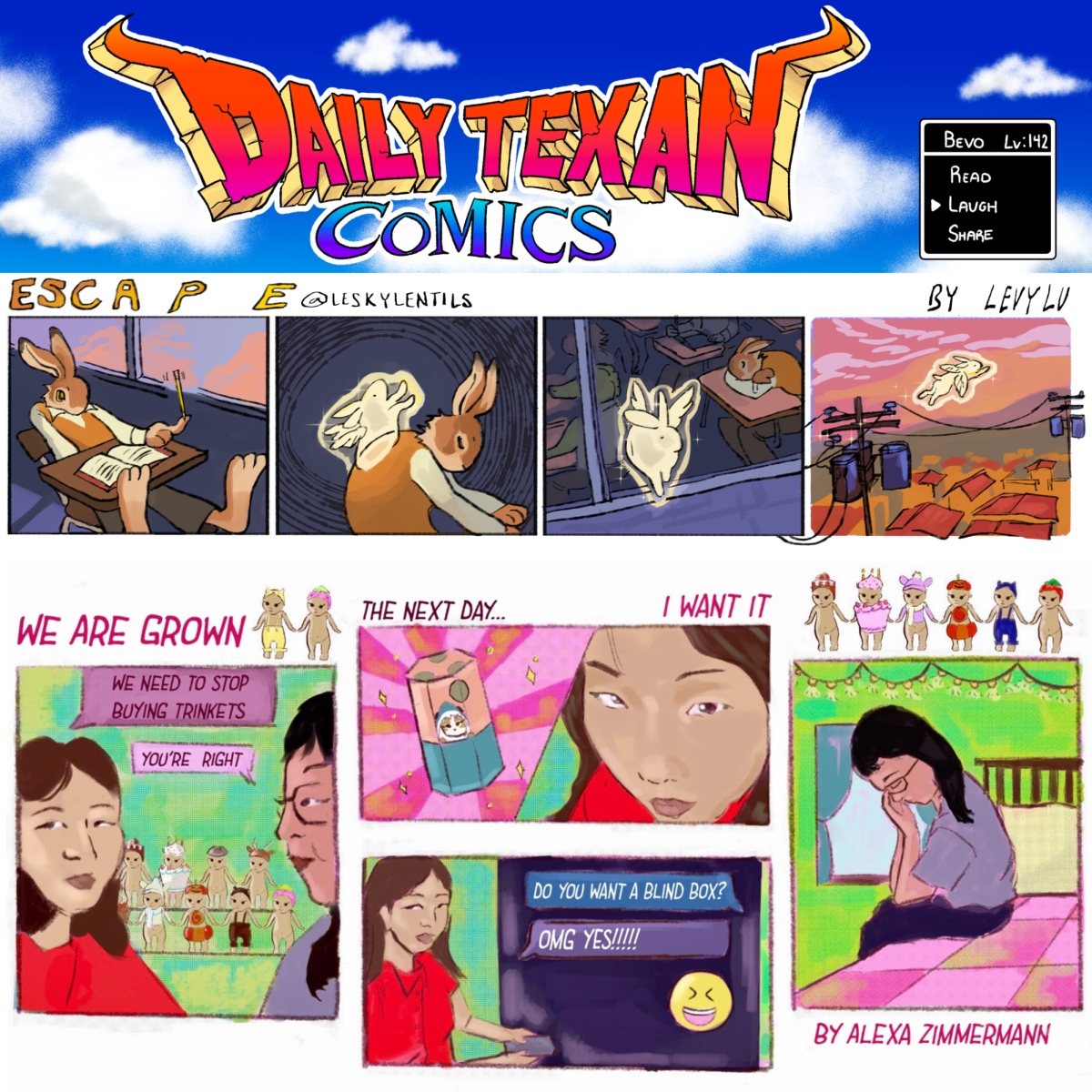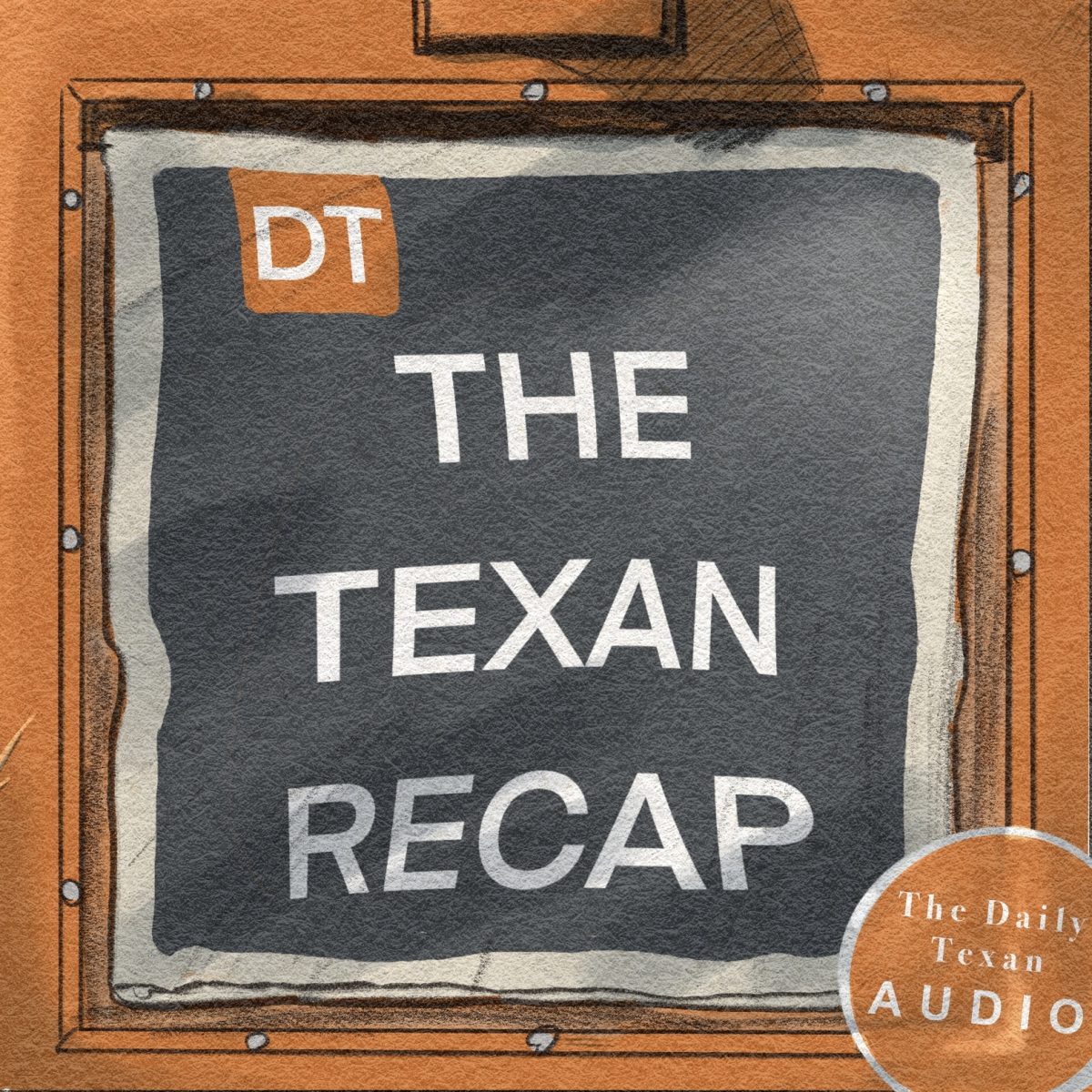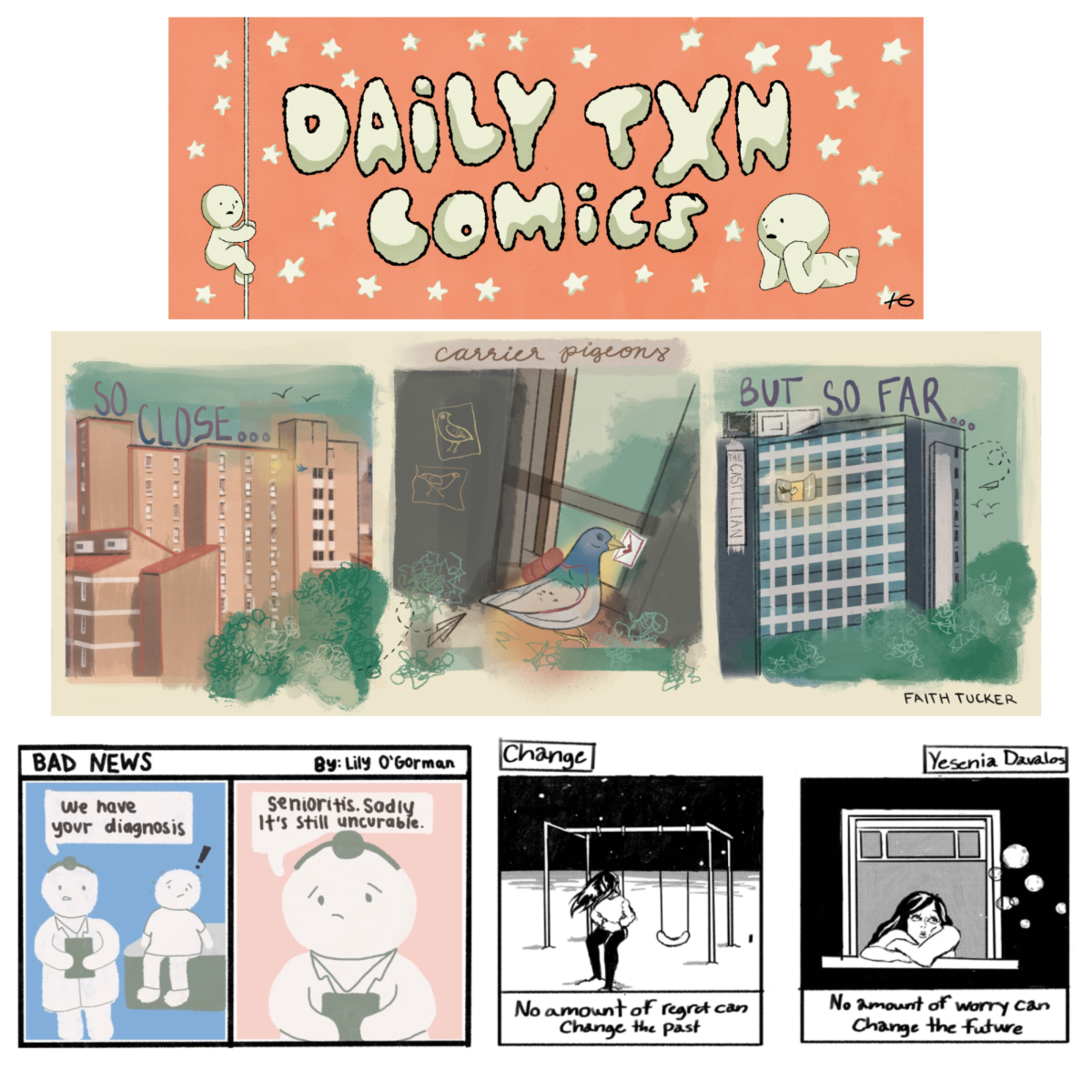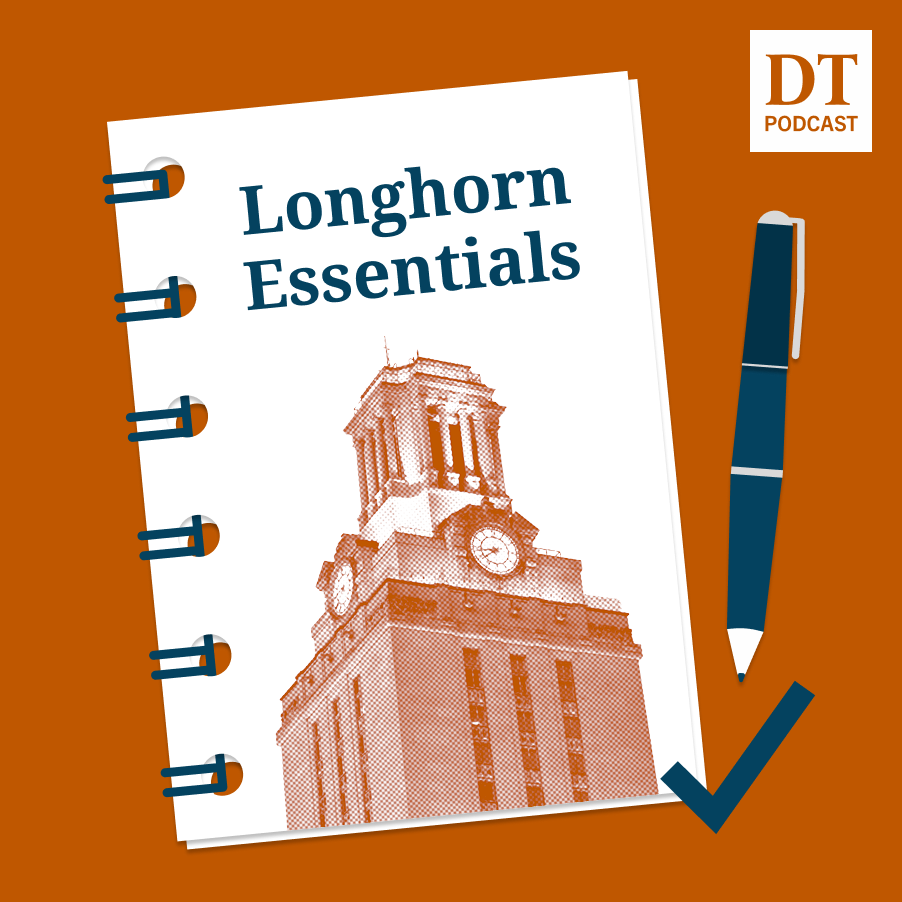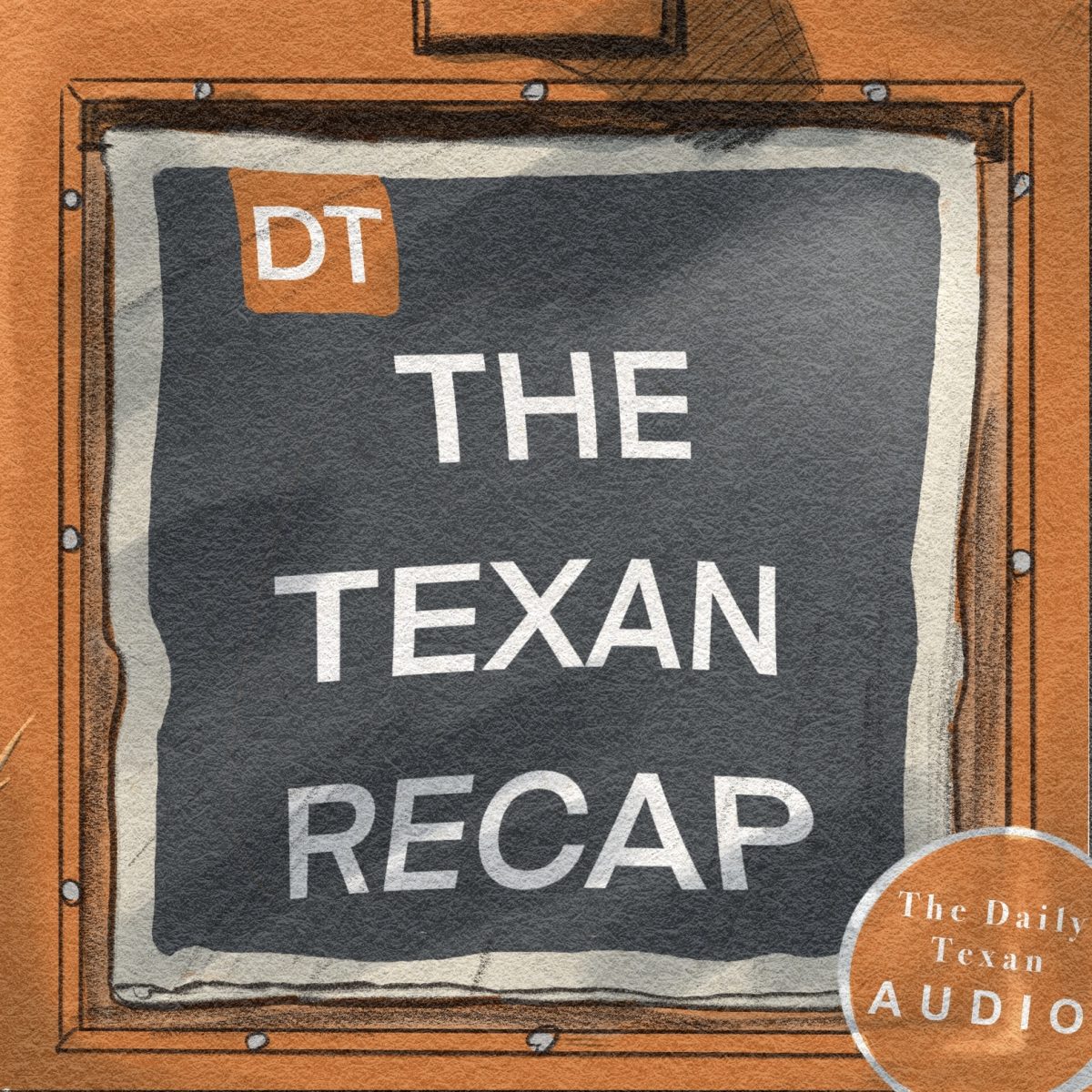Editor’s Note: This podcast was originally published on Spotify on August 25, 2023.
In this new series, we highlight a few important stories The Daily Texan reported that week. In the first episode, Audio Editor Auslyn Gaddis chats about the new student government administration, plans for a UT medical center, the West Camus Ambassadors program and a new AI literacy course offering.
Reported by Celeste Hoover, Raiyan Shaik, Mason Rouser and Laurel Pinchback. Hosted and produced by Aislyn Gaddis. Cover art by Emma Berke. Music by Top Flow Productions.
*upbeat music*
Aislyn Gaddis: The new UT student government faces a setback and plans for a university medical center.
I’m your host this week, Aislyn Gaddis and this is The Texan Recap, a new series from the Texan Audio Department, recapping a few important news stories the Texan covered that week. Over the course of the semester, you’ll get a hear from a lot of Texan reporters, and maybe a few different hosts as well.
Plus, a West Campus Ambassadors program is in full swing, and a new AI literacy course.
Here’s what you missed this week
*upbeat music*
Aislyn: Helen Getachew and William Ramirez were elected Student Government President and Vice President last spring after running on a platform of improving student equity on campus.
Then, in June, the Texas Legislature banned DEI offices and initiatives, which places a bit of a roadblock in our new student government’s plan.
General reporter for Life & Arts Celeste Hoover is here to tell us more. Hi Celeste, thanks for joining me.
Celeste Hoover: Hi Aislyn, I’m super happy to be here.
Aislyn: So, what is the student government at UT responsible for?
Celeste: Yeah, so from my understanding, speaking with our new president Helen, it’s really just a tool of communication for students.
So a lot of their responsibilities include channeling students’ wishes or things they wish to see enacted on campus, um, and communicating that to the right people at the university, which, as we know, is just this huge bureaucracy that, uh, the student government can kind of help us navigate.
Aislyn: And who is on the current administration and what sort of experience do they have?
Celeste: Sure. So we have a lot of new people coming in. Um, a lot of them are younger students who spent the summer, you know, either interning, uh, with local politicians or traveling to Washington and doing scholarships there.
They are definitely young people with unique perspectives. Maybe people who come from groups that have been historically underrepresented on this campus, especially in the student government.
I have a feeling we’re looking at big change coming from them. Uh, just based on their backgrounds, their, you know, the steps they’ve taken to ensure that there is, in fact, going to be a difference between this administration and perhaps past administrations.
Aislyn: And what platform did they initially run on?
Celeste: Sure. So they ran on four initiatives or four platforms, all of which are focused in especially on, um, equity on campus.
So I asked our president Helen and our vice president William, as well as some members on the student government board, what equity meant to them and exactly how these platforms are going to play out in the day-to-day life of students this year. There seems to be a focus on housing and dining, especially the growing cost of housing and dining on campus and in West Campus.
How there is a growing divide between the students who can afford and cannot afford these things. That gap is widening, especially at UT, uh, they’re going to take steps to remedy that and enact new policies that can hopefully even that out, but as well as, uh, you know, equity within academia and access to resources, uh, you know, students are having trouble affording books, they’re having trouble, uh, making it to class on time, you know, do you or do you not have transportation?
The things, uh, you know, more privileged students don’t even think of other students are having to, you know, plan their entire semester around
Aislyn: So, from my understanding, their initial platform included some D&I initiatives. And now, that’s not exactly allowed by the Texas Legislature. So how have they shifted since they initially ran?
Celeste: That’s exactly right. So, uh, I talked to the student government in detail about this. That was a huge roadblock they encountered.
They fought very hard to keep that from, uh, encroaching on UT students’ rights. Uh, unfortunately, they are somewhat limited in this area now, but not extremely so. The D&I bill is, uh, it targets select areas of the university, which mostly includes education and organization. So they can still enact most of these policies under the name of equity.
It’s just a matter of how do they have to phrase the messaging and how are students going to be able to recognize the messaging so they might have to get a little bit more creative and what they do enact and how they communicate what they enact. But to my understanding, the plan and especially the personal drive of a lot of these members of student government has not changed and in fact, they perhaps have become more passionate about these platforms in regards to the D&I bill.
Aislyn: So what might this mean for students going forward?
Celeste: Sure. So students should be on the lookout for, like I said, this slightly unique messaging that they’re going to put out there, as well as these personal initiatives.
I spoke with a member of the board the other day. He mentioned student coalitions in great detail. The student government works closely with student groups. As I mentioned, one of their goals is to communicate and filter students’ wishes and students’ desires to the correct faculty to make sure change is enacted.
And I think students should be on the lookout for not only UTSG policy and platforms, but they should also, you know, find the motivation to make change themselves, to take that upon themselves in the face of this D&I, uh, bill. They too can, you know, get in touch with UTSG, they can form their own groups, they can make their own messaging. If there is something on campus that you think is inequitable, is unfair, is putting a group of students at a disadvantage, whether that’s housing and dining, academic resources, or anything else on campus. Students have more than enough power under this government to make change.
Aislyn: That was general life and arts reporter Celeste Hoover. Celeste, thanks for joining me.
Celeste: Thank you so much for having me.
*upbeat music*
Aislyn: On August 14, the UT system board of regents announced plans for a new University of Texas at Austin Medical Center.
They will establish two hospitals — The University of Texas MD Anderson Cancer Center and a UT Austin hospital.
UT’s MD Anderson Cancer Center in Houston is one of the nation’s top cancer hospitals, and they plan to offer that same specialty care to Central Texas patients.
The hospitals will be built on the site of the Frank Erwin Center, which is expected to be demolished by October 2024, and officials anticipate they will break ground for the medical center in 2026.
This story was reported on for the Texan Senior News Reporter Raiyan Shaik
*upbeat music*
Aislyn: UT recently implemented a West Campus Ambassadors program
Senior news reporter Mason Rouser covers city and politics for the Texan is here with the story. Mason, thanks for joining me.
Mason Rouser: Hi, thanks so much for having me.
Aislyn: So earlier this month, UT announced a new West Campus Ambassadors program. Can you tell me what that is?
Mason: Yeah, so the West Campus Ambassador Program is the newest initiative in an 8 million investment made by the UT System Board of Regents in 2020 to increase safety in the West Campus neighborhood.
So basically, they’re just a specialized team of ambassadors that will carry out a range of duties, including safety services, cleaning and sanitation, as well as various hospitality duties.
Aislyn: So there are the Safety Ambassadors and the Cleaning Ambassadors. What do the Safety Ambassadors do?
Mason: So the Safety Ambassadors, um, do a range of things.
First thing to know is that they operate every day by, you know, walking patrols, bike patrols, or by truck from 3:30 p.m. to 3:00 a.m. every single day. Um, and they provide resources and safety tips for residents. Um, they escort residents, so if you feel unsafe in the neighborhood, you can call them and they’ll help you get where you’re going.
Um, they discourage begging and panhandling, um, and then they also just sort of monitor the area, working with local law enforcement and acting as an extra set of eyes, um, and to just be a safety presence, uh, for the neighborhood.
Aislyn: And what about the cleaning ambassadors?
Mason: So the cleaning ambassadors operate every day from 7 a.m. to 3:30 p.m. Um, and they do things like picking up trash and litter. They’re pressure-washing the streets and the sidewalks. Um, they’re cleaning street fixtures, removing graffiti and stickers from buildings and street fixtures as well. Um, and then they are also mainly tasked with hospitality duties.
So that includes like, if you’re lost, they can help you provide directions, point you where you need to go. Um, as well as homeless outreach and de-escalation if it is needed.
Aislyn: Where in West Campus do they operate?
Mason: Um, so they kind of operate in all of West Campus. So that includes kind of from East to West, they start at Guad and go all the way to North Lamar, and then from North to South, they start at 29th Street, and then go all the way to MLK.
But even within West Campus, they have it split up. So they have two zones. Zone 1 is the closest to campus. starts at Guad and goes to Nueces, um, and there the Safety Ambassadors will operate daily as well as the Cleaning Ambassadors, so they’re always going to be there, but then Zone 2 starts at Nueces and goes all the way to North Lamar, and Safety Ambassadors will be there every day as well, um, but Cleaning Ambassadors will only be there kind of when they’re called and when they’re needed.
Aislyn: And what kind of training do these Ambassadors receive?
Mason: Yeah, so I was able to talk to, um, a regional vice president of Block by Block, which is the company that manages, uh, the West Campus ambassadors, and they do a lot of this all over the country. They even have two other ones in downtown Austin and one on South Congress in Austin.
And what I was told was that, um, the ambassadors are really not supposed to be, like, an intervention force. They…the word that was used was they have a soft approach. So they’re supposed to be hospitable, um, easily observed, um, and just something to be there on standby for when residents need it and can report issues that are going on in the neighborhood.
Um, they also have monthly mental health training, um, to assist them in their interactions, of course, with individuals as they are talking with people all the time, but then especially in their, um, work with homeless outreach and de-escalation. Um, and even on top of that.
They also work with a lot of local resources. Like I said, they have a presence in Austin, um, in other areas. So they’re very familiar with a lot of the resources that we have here in Austin. So, um, for example, they work with like the sobering center here in Austin for, um, if the ambassadors themselves don’t have all the knowledge and expertise to really give someone the help that they need, um, they’re able to kind of pass that off to other people that can be of better service to those individuals.
Aislyn: If a student does need help, how can they reach out to the ambassador program?
Mason: So, um, you can find a lot of their information on their website, which is wcambassadors.org, but if you need them more urgently, they do have a hotline that you can text or call at the number 512-429-3278.
Aislyn: That was Senior News Reporter Mason Rouser. Mason, thanks so much for being here.
Mason: Thank you!
*upbeat music*
Aislyn: Starting this week, UT is launching a new AI literacy course for students and faculty.
The course is a collaboration between UT’s Department of Computer Science and the research grand challenge Good Systems.
It’s a one-semester, one-credit-hour course designed to give students a basic understanding of AI’s uses and possible impacts.
You can register for the course through September 8, and auditing options are available.
This story was reported on for the Texan by General News Reporter Laurel Pinchback
And that’s The Texan Recap for the week of Aug 21…I’m Aislyn Gaddis
*upbeat music*
Aislyn: This episode was a production of The Daily Texan Audio Department. Hosted and produced by me, Aislyn Gaddis. Special thanks to Celeste Hoover, Mason Rouser, and Raiyan Shaik for their reporting, and to Katy Nelson, Mimi Calzada, and Chloe Moore for helping me get this project started. Cover art is by Emma Berke and music is by Top Flow Productions. To read the news stories in this episode or see more from the Texan, head over to thedailytexan.com. Thanks for listening, and see you next week.
*upbeat music*

